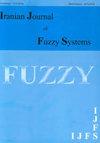Continuous probability-interval valued fuzzy preference relations and its application in group decision making
IF 1.2
4区 数学
Q1 MATHEMATICS
引用次数: 0
Abstract
Probabilistic hesitant fuzzy set represents the occurrence probabilities of elements.The probabilistic hesitant fuzzy preference relations can more effectively express thehesitant preference information of decision makers.But in the existing research, all of them are based on discrete probability distribution.In order to give decision maker more evaluation space,continuous probability distribution is necessary to be considered.Therefore, in this paper, the continuous probability-interval valued fuzzy setis defined and its probability is represented by a probability density function.A method of converting probabilistic hesitant fuzzy set into continuous probability-interval valued fuzzy setis developed to transform discrete data into continuous data.Then, the continuous probability-interval valued fuzzy preference relations is presented.In order to consider the consistency of continuous probability-interval valued fuzzy preference relations, the multiplication consistent expected preference relations is proposed.The individual consistency index and group consensus index are also presented to determine the consistency level.And then, an algorithm is introduced for checking and improving the individual consistency level andgroup consensus level.Finally, a numerical example is shown to the effectiveness of proposed algorithm,the comparative analysis is given with the existing methods toshow the superiority of this algorithm.连续概率区间模糊偏好关系及其在群体决策中的应用
概率犹豫模糊集表示元素出现的概率。概率犹豫模糊偏好关系能更有效地表达决策者的犹豫偏好信息。但在现有的研究中,它们都是基于离散概率分布。为了给决策者更多的评价空间,需要考虑连续概率分布。因此,本文定义了连续概率区间模糊集,并将其概率用概率密度函数表示。为了将离散数据转化为连续数据,提出了一种将概率犹豫模糊集转化为连续概率区间模糊集的方法。然后,给出了连续概率区间模糊偏好关系。为了考虑连续概率区间模糊偏好关系的一致性,提出了乘法一致期望偏好关系。并提出了个体一致性指标和群体共识指标来确定一致性水平。然后,介绍了一种检测和提高个体一致性水平和群体一致性水平的算法。最后通过一个算例说明了所提算法的有效性,并与现有方法进行了对比分析,说明了所提算法的优越性。
本文章由计算机程序翻译,如有差异,请以英文原文为准。
求助全文
约1分钟内获得全文
求助全文
来源期刊
CiteScore
3.50
自引率
16.70%
发文量
0
期刊介绍:
The two-monthly Iranian Journal of Fuzzy Systems (IJFS) aims to provide an international forum for refereed original research works in the theory and applications of fuzzy sets and systems in the areas of foundations, pure mathematics, artificial intelligence, control, robotics, data analysis, data mining, decision making, finance and management, information systems, operations research, pattern recognition and image processing, soft computing and uncertainty modeling.
Manuscripts submitted to the IJFS must be original unpublished work and should not be in consideration for publication elsewhere.

 求助内容:
求助内容: 应助结果提醒方式:
应助结果提醒方式:


